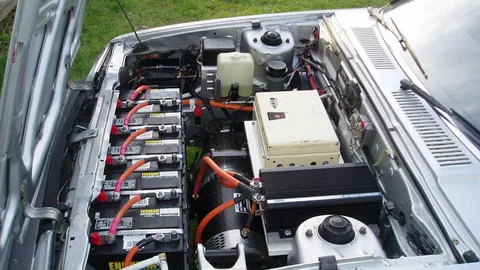Electric Car Motor Conversion | Costs, Considerations, and How It Works
People across the globe are shifting towards electric vehicles (EVs). It is not surprising to see car lovers and eco-friendly individuals thinking about converting their gasoline cars to electric cars. The process of electric car motor conversion is becoming popular as many people look for eco-friendly options to combustion engines.
What’s needed to replace a car’s motor with an electric one? How much will it set one back financially? Can an electric motor fit any vehicle? This guide will walk you through everything there is to know about changing your vehicle to electric, from costs to motor size and compatibility.
How Much Does It Cost To Adjust A Cars Motor To An Electric One?
Adjusting a cars motor to an electric one requires many steps which, when added up, come with a cost. The total cost will depend on many factors such as: the model of the car, complexity of the conversion, and the components chosen. Here is a list of the expenses that will incur for a basic electrical vehicle:
1. Charging an Electric Motor Performed.
Motors are perceived as the most critical aspects of the vehicle and its parts. For a given vehicle, the electric motor will set you back anywhere from $1,000 to $5,000 based on your power needs. There are many available options and each one has varying levels of performance which translates to more costs.
2. Battery Pack Details.
Another feature that has a direct correlation towards the vehicle’s ability and efficiency is a battery pack. Simply having a battery pack for your electric vehicle will incur a $5,000 charge and can go all the way up to $15,000. They say the average electric vehicle spends on a battery pack is highly dependent on its energy capacity in terms of selecting kilowatt hours (kWh) it has which affects the range of the vehicle.
3. Conversion Kit and Other Components
A conversion kit comes with all the components for an electric motor conversion which includes, but is not limited to, the controller, cooling system, wiring, and all other electrical parts. As of now the price for a conversion kit is usually between $1,500 to $5,000. Other parts like transmission systems or adapter plates will most likely add to the cost.
4. Labor and Installation Costs
Electric car conversion is a delicate work that is not as simple, therefore it requires proficiency. Professional installation costs are priced differently at different shops, however, it is common to see the labor costs at anywhere between $5,000 and $10,000 or above depending on the shop and complexity of the project.
Total Estimated Cost
All things considered, it is usually around $10,000 to $30,000 for converting a car to use an electric motor, although this is subject to change depending on the type of model a car is, and the conversion kit chosen.
Though the estimated cost might sound steep, the reduction in costs for maintenance or fueling the car, as well as the environmental effect it has makes it an appealing offer in the long haul.
How Much Does It Cost to Convert a Car into an EV?
When we talk about transforming a vehicle into an electric car, also known as an EV conversion, it is intertwined with the costs of an electric motor conversion. This is because anything having to do with EVs includes adding things like motors and batteries. The EV conversion is also the most expensive form of conversion. I will break down the list into segments to describe the costs:
1. Selection of the Vehicle and Its Compatibility
What type of car you intend to convert impacts its cost heavily. In this case, compact cars with their lightweight structure are small in size and thus cheaper to convert than their larger counterparts. It is easier to fit smaller motors and batteries on the compact cars. Additioanlly, classic vintage cars appeal to many people, and with an EV conversion increases their resale price. However, these classic cars can be costly due to the custom work needed for the conversion. It can be anywhere from $8,000 to $40,000.
2. Battery and Range Considerations
The distance your car can travel on a single charge is dictated by the size of the battery. While increased battery capacity allows for greater distance, it also increases the cost. In the case of an EV conversion, budget about $5,000 to $15,000 for a battery pack providing 100-150 miles of range. Additional spending is required for increased range or for larger vehicles.
3. Additional Components
Power electronics such as controllers and motors add to the cost of the conversion, along with the electric motor, regenerative braking system, and other components. These devices ensure controlled and efficient energy usage, controlled energy flow, and improved vehicle performance.
What Size Electric Motor is Necessary to Drive a Car?
Perhaps the most important factor when converting an electric vehicle is making sure the car is equipped with the right motor size and strength. Top speed and acceleration are predefined by the motor’s power, which makes it critical to select the right amount of power tailored to one’s needs.
Factors Affecting Motor Size
Weight of the vehicle: Heavier vehicles will require stronger motors if decent acceleration and top speed are to be achieved.
Desired Speed and Performance: To preserve high-speed capabilities or maintain a performance-oriented conversion, a larger motor will be required.
Energy Efficiency: A larger motor would consume energy, which may lead to reduced battery capacity. Finding the right balance between motor size and battery capacity is vital.
Typical Motor Sizes
For most standard car conversions the power of the electric motor is expressed in kilowatts (kW). The following give approximate ranges of kilowatts suitable for different types of vehicles:
Small Cars: 20-40kW motor (approximately 27-54 horsepower).
Medium Cars: 40-75kW motor (approximately 54-101 horsepower).
Large Cars: 75-150kW motor (approximately 101-201 horsepower).
The electric motor’s power, in kilowatts, corresponds to the vehicle’s horsepower. Whichever motor size you decide to go with will depend on your driving habits and the extent of performance you desire from your electric vehicle.
Can You Put an Electric Motor In Any Car?
The conversion of nearly any car into an electric one is plausible – at least in theory. Nonetheless, proper deliberation addressing the considerations listed below is necessary before proceeding with any changes:
1. Room Limitations
The location of the electric motor and batteries in the car has to be positioned within the parameters of the current chassis. For some of the older and smaller make cars, the limitations regarding space may become problematic since they won’t be able to accommodate the bulky electric motors or large battery packs. More often than not, this may require some level of fabrication to ensure these changes are compatible, which drives up the cost.
2. Structural Changes
Some older cars and those from certain makes may need to undergo structural changes in order to appropriately support the electric motor and battery pack. These changes could include altering the suspension system or adding more powerful cooling systems for the motor alongside reinforcements to the chassis.
3. Integration with Existing Systems
The electric dashboard or wiring system of the new motor might not be integrated with the current systems of the vehicle. Therefore, these systems will have to be changed. Even though these requirements might take considerable effort and resources, it is critical to guarantee the safety and practicality of the alteration.
4. Ensuring Compliance to Rules and Regulations
Every region has unique laws and regulations pertaining to vehicle modifications, particularly focusing on the safety features and emissions of the vehicle. It’s advisable to verify the local laws concerning vehicle conversion before proceeding with an EV conversion project.
It is possible to put an electric motor in any car, but some car makes and models will require more work than others. Certain vehicles are more ideal for conversions than others, which also means some will require more effort.
Final Points on Electric Car Motor Conversion
Undertaking an electric vehicle project may be thrilling, and even satisfying, but it is essential to have proper planning for the expenses, parts, and additional important details. For someone looking into the option of electric car conversion, a few things will need thoughtful consideration, such as determining how much it costs to convert a car to an electric motor and how big of an electric motor will be needed.
With the right selection of motor and battery, the estimated expenditures for converting a vehicle into an electric one is subject to change, but with thoughtful planning, the conversion can result in a cost-efficient and eco-friendly car. And to answer the question of whether “putting an electric motor in any car is possible”, the answer is yes—however, some cars are more complex than others.
If you want to support a greener option or are excited about electric cars, converting your current vehicle can be a fun car project.



Post Comment